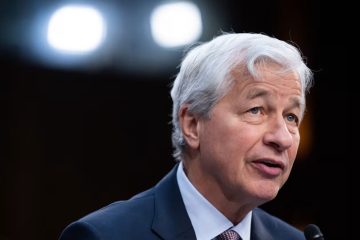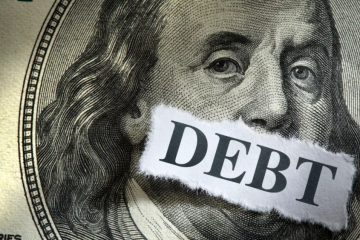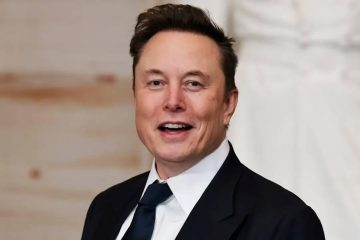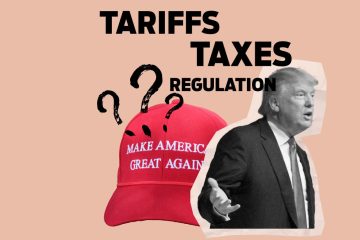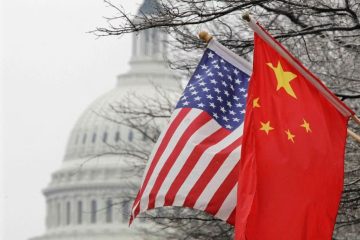Trump Rally Has Turned These CEOs Into Billionaires

It’s just as many Donald Trump voters hoped: Putting a self-proclaimed billionaire in the White House has already made other Americans a lot wealthier—a select few of them, anyway.
Since the presidential election, the U.S. stock market has risen powerfully, with the S&P 500 up about 6% in just over two months in the so-called Trump Bump rally. Besides boosting the portfolios of many individual investors, and the wealth of many executives who were already billionaires, the upswing has also swelled the public stock holdings of a few CEOs enough to push their net worth over the $ 1 billion threshold for the first time, a Fortune analysis of S&P Capital IQ data found.
The freshly minted billionaires include four chief executives, most of whom you’d likely never heard of before they entered the Three Comma Club. They range from the head of a grocery store that prides itself on its own homemade ice cream to the chief of a Fortune 500 company.
A fifth exec, Jack Dorsey, CEO of Square (sq), also saw his stock holdings in the mobile payments company surpass $ 1 billion as Square’s shares surged 20% in the wake of the election. But Dorsey also runs Twitter (twtr), and his lesser stake in that company (worth about $ 260 million) had already put him over the top into 10-figure territory.
Below, meet the new class of Trump-era billionaire CEOs:
1. Jonathan Weis: CEO, Weis Markets
Current value of company stock holdings: $ 1.05 billion
Value on election day: $ 898 million
Post-election stock price change: 16.8%
More than 100 years after his grandfather founded Weis Markets (wmk) in Pennsylvania, CEO Jonathan Weis’s stake in the grocery store chain has made him a billionaire. Indeed, the 48-year-old executive’s net worth has jumped by more than $ 100 million since the presidential election as Weis Markets stock has risen nearly 17%. That’s despite the fact that the company, which has stores in seven states across the Eastern seaboard from New York to West Virginia, has not announced any news in that time frame. Weis Markets, now with a market value of about $ 1.7 billion, processes its own milk and makes its own ice cream in house—50 flavors of it. In 2015, CEO Weis earned $ 5.4 million.
2. Robert Wilmers: CEO, M&T Bank
Current value of company stock holdings: $ 1.04 billion
Value on election day: $ 827 million
Post-election stock price change: 25.5%
Having accumulated nearly 6% of M&T Bank (mtb) stock in his more than three decades as CEO, octogenarian Robert Wilmers has officially entered the billionaires club. Under his leadership, the community bank, based in Buffalo, N.Y., has grown to have a market cap of $ 24 billion. That’s thanks in part recently to Trump, whose economic policies are expected to boost interest rates and cut financial regulations which should help institutions like M&T. Indeed, the bank’s stock price has soared nearly 26% since the election. More than half of Wilmers’s shares are held by his wife or various foundations and offshore companies which he controls. But he seems to have lived comfortably for a while now: He made more than $ 3 million last year, and perks of the job include the use of a private plane.
3. John Gerlach: CEO, Lancaster Colony
Current value of company stock holdings: $ 1.03 billion
Value on election day: $ 963.6 million
Post-election stock price change: 6.7%
Lancaster Colony (lanc), based in Columbus, Ohio, makes specialty foods — from Marzetti’s Simply Dressed salad dressings to Romanoff caviar. John Gerlach, 62, will celebrate his 20-year anniversary as CEO of the company in 2017, earning more than $ 1.5 million on top of his newfound billionaire net worth. Given that he owns nearly a third of the Lancaster Colony’s stock, Gerlach has foregone collecting a bonus for the last two years, according to the company’s filings.
4. Stuart Miller: CEO, Lennar
Current value of company stock holdings: $ 1.01 billion
Value on election day: $ 947.7 million
Post-election stock price change: 6.3%
Stuart Miller has the unique distinction of being the only Fortune 500 CEO to become a billionaire since Trump was elected: His homebuilding company, Lennar (len), ranks No. 301 on the 500 list. And Miller, 59, is also by far the highest-paid CEO of the new billionaires on this list, having earned nearly $ 18 million in 2015, including a bonus of almost $ 12 million. Some investors expect the American economy and housing market to thrive during Trump’s term in the White House, spurring the recent rise in shares of Lennar and landing Miller in the billionaire camp.
Other Winners
Besides those four, the Trump Bump rally has also tacked on an additional billion dollars to the net worth of several other already-rich executives. Warren Buffett, a frequent critic of Trump and a Hillary Clinton supporter, has actually profited the most from the GOP candidate’s surprise win: Buffett’s shares in Berkshire Hathaway (brk.a) are now worth $ 6.4 billion more than they were at the time of the election, after the company’s stock price rose nearly 10% since then. Elon Musk, CEO of Tesla (tsla), whose stock is up 18% over the same period, is now more than $ 1.2 billion richer.
Harold Hamm, CEO of Continental Resources (clr) — and a friend and advisor of Trump himself — has gained $ 1.6 billion in wealth since the election, based on the 12% increase in his oil company’s stock price. And Dish Network (dish) CEO Charles Ergen’s stock holdings are worth nearly $ 1.3 billion more than they were before Trump won. Of course, those four men have been multi-billionaires for a long time now.
On the flip side, billionaire Sheldon Adelson, CEO of Las Vegas Sands Corp. (lvs), has lost $ 1.4 billion as the Trump rally left his casino company behind; its shares are down more than 6% since the election. Hedge fund billionaire George Soros lost nearly as much in that time, mistakenly making bearish calls on stocks, according to The Wall Street Journal.
Still, so far it seems pretty good to be a member of the wealthiest 1% under the Trump administration. The incoming President — who himself claims a $ 10 billion net worth — has filled his Cabinet with billionaires and almost-billionaires, and promised tax policies that will be friendlier both to high-net-worth individuals and their companies. If that’s the case, expect more Fortune 500 billionaires to come.





